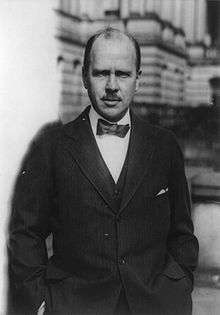Hugh R. Wilson
| Hugh Robert Wilson | |
|---|---|
 1927 | |
| Born | January 29, 1885 |
| Died | December 29, 1946 (aged 61) |
| Nationality | United States |
| Known for | Diplomat |
Hugh Robert Wilson (January 29, 1885 – December 29, 1946) was a member of the United States Foreign Service, who headed the U.S. mission to Switzerland for ten years beginning in 1927. He became Assistant Secretary of State in 1937[1] and served for several months in 1938 as U.S. Ambassador to Germany.
Overview
Wilson was born on January 29, 1885, in Evanston, Illinois, to Hugh Robert and Alice W. Wilson.[2] He attended Yale University graduating in 1906.[3] He worked in business for a few years and studied at the École Libre des Sciences Politiques, Paris in 1910.[2] He served briefly in the U.S. delegation in Lisbon until, upon passing examinations for the Diplomatic Service, he was appointed Secretary to the U.S. delegation in Guatemala.[4] While in that post, Wilson married Katherine Boyle in London on April 25, 1914.[5] He later served in Buenos Aires, Berlin, Vienna, Tokyo, and Berne.[6] From 1924 to 1927 he worked in Washington as Chief of the Division of Current Information of the U.S. Department of State.[2]
He held the position of Envoy Extraordinary and Minister Plenipotentiary to Switzerland from 1927 to 1937, and during those years represented the United States at many international conferences.[2] On August 23, 1937, he became Assistant Secretary of State.[7] He served as U.S. Ambassador to Germany from March 3, 1938, to November 16, 1938.
He attended the congress of the Nazi Party in Nuremberg in September 1938, breaking with the precedent established by his predecessor, William E. Dodd, who had refused to attend. In Dodd's absence, the embassy's chargé d'affaires had attended the previous year.[8] President Roosevelt called Wilson home for urgent consultations in November 1938 following the anti-Jewish attacks of Kristallnacht and he never returned to Germany.[9]
Wilson coined the phrase "pretty good club" while describing the foreign service. When he was the ambassador to Germany he sought to emphasize the positive aspects of Nazi Germany. He accused the American press of being "Jewish controlled" and of singing a "hymn of hate while efforts are made over here to build a better future." He praised Hitler as the man who has pulled his people from moral and economic despair into the state of pride and evident prosperity they now enjoyed." [10]
Yale awarded Wilson an honorary Doctor of Laws degree in 1939.[11] Bryant College awarded him an honorary degree the same year.[12]
Wilson held the title Advisor to Secretary of State until he retired from the Foreign Service on December 31, 1940.[13] He returned to government service following the attack on Pearl Harbor and worked at the Office of Strategic Services from 1941 to 1945. He then accepted an appointment as chief of the foreign affairs section of the Republican National Committee.[14]
With Pierre Cot, a French Cabinet Minister throughout the 1930s, Wilson taught a course at Yale in the spring of 1941.[15]
Wilson died on December 29, 1946, in Bennington, Vermont, following a long illness.[16] He is buried in Chicago's Rosehill Cemetery.[17]
Wilson's son Hugh R. Wilson, Jr., deposited his fathers papers at the Herbert Hoover Presidential Library in 1968.[2]
Works
- The Education of a Diplomat (NY: Longmans, Green and Co., 1938)[18]
- Diplomat between Wars (NY, Longmans, Green & Co., 1941)[19]
- A Career Diplomat: The Third Chapter, The Third Reich (NY: Vantage Press, 1960)
- Disarmament and the Cold War in the Thirties (NY: Vantage Press 1963)
- Descent into Violence - Spain, January–July 1936 (Ilfracombe, Stockwell, 1969)
Sources
- ↑ New York Times: "Hugh R. Wilson Takes Oath," August 24, 1937, accessed August 31, 2011
- 1 2 3 4 5 Herbert Hoover Presidential Library and Museum: "Hugh R. Wilson Papers", accessed August 31, 2011
- ↑ New York Times: "Wilson to Attend Party," December 2, 1938, accessed August 31, 2011
- ↑ New York Times: "Win Diplomatic Posts," January 9, 1912, accessed August 31, 2011
- ↑ New York Times: "Hugh R. Wilson Weds," April 26, 1914, accessed August 31, 2011
- ↑ TIME: "Chameleon & Career Man," December 20, 1937, accessed August 31, 2011
- ↑ New York Times: "Hugh R. Wilson Takes Oath," August 24, 1937, accessed September 1, 2011
- ↑ New York Times: "Wilson to Attend Rally," August 26, 1938, accessed September 1, 2011; New York Times: "Nazi Victory in Austria Stressed as Nuremberg Congress Opens," September 6, 1938, accessed September 1, 2011
- ↑ New York Times: "U.S. Envoy Arrives to Report on Reich," November 26, 1938, accessed September 1, 2011
- ↑ In the Garden of Beasts, Erik Larson
- ↑ New York Times: "2,700 Cheer Benes Getting Yale LL.D.," June 22, 1939, accessed September 1, 2011
- ↑ Bryant Alumni Bulletin: Deaths, January 1947, accessed September 1, 2011
- ↑ New York Times: "H.R. Wilson Retires; Was Envoy to Reich," November 25, 1940, accessed September 1, 2011
- ↑ New York Times: "Hugh R. Wilson Joins Republican Advisers," April 12, 1945, accessed August 31, 2011
- ↑ New York Times: Pierre Cot Appointed to Give Course at Yale," January 27, 1941, accessed September 1, 2011
- ↑ TIME: "Milestones," January 6, 1947, accessed September 1, 2011
- ↑ Find a Grave: Hugh Robert Wilson, accessed August 31, 2011
- ↑ New York Times: J. Donald Adams, "A Diplomat's Formative Years," March 27, 1938, accessed August 31, 2011
- ↑ New York Times: C. Hartley Grattan, "A Diplomat's Experience between Wars," March 30, 1941, accessed August 31, 2011
| Diplomatic posts | ||
|---|---|---|
| Preceded by William Dodd |
United States Ambassador to Germany March 3, 1938–November 16, 1938 |
Succeeded by Alexander C. Kirk |